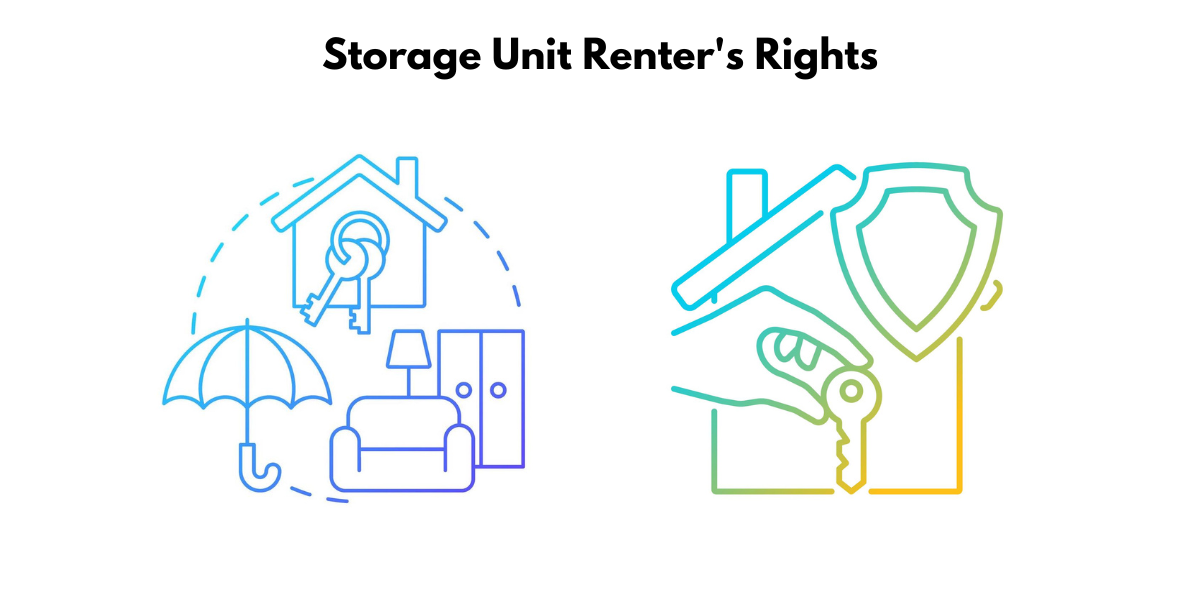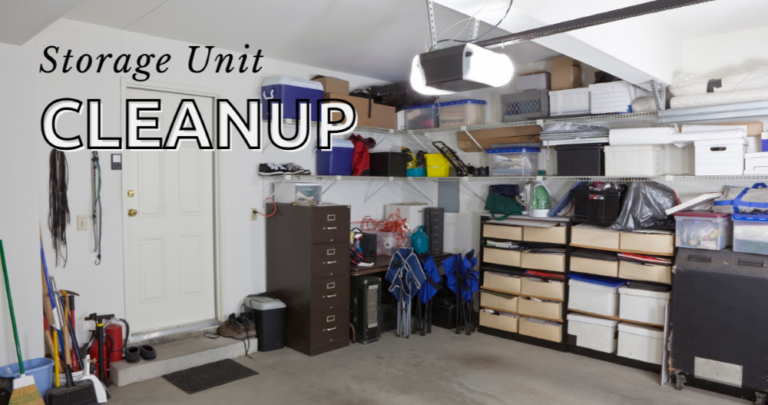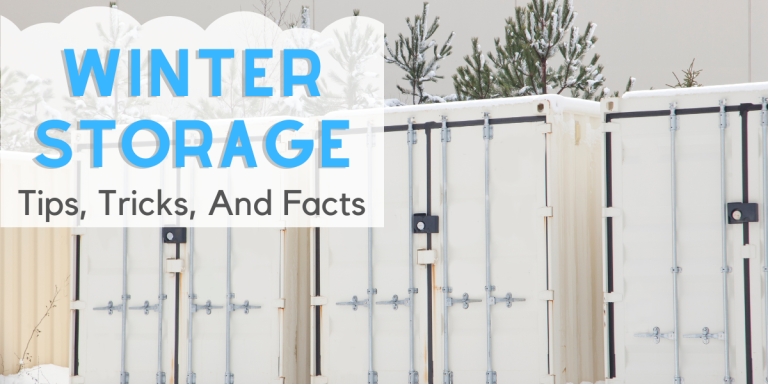The Storage Unit Renter’s Rights: 10 storage laws you need to know
Storage unit renters’ rights
Learning the Storage unit renters’ rights is important because it will ensure that you enter into a legally binding agreement with the storage facility’s owner.
Knowing your rights as a renter and the contract terms you are signing will help protect you from any potential disputes or problems that may arise.
Knowing the state laws that govern storage facilities can also help you understand what happens if the rent is not paid or if there are any items with a lien in the storage unit.
Additionally, it is important to know the security deposit requirements and any items the owner will not allow to be stored in the unit.
Understanding the laws and rights of renting a storage space will help ensure a secure and positive experience.
Storage rental laws
Renting a storage unit for your belongings is a relatively simple process, but it comes with certain laws that must be followed to protect both the renter and the property owner.
These laws can vary from state to state, so it is important to check the laws in your area to know your rights as a renter or property owner.
Late fees
Late fees for storage rental laws allow owners to recoup lost rental payments.
Depending on state and local laws, they are typically charged when the tenant does not pay the rent on time and can range from twenty dollars to twenty percent of the monthly rental amount.
In some states, a late fee can be multiplied for each month the renter is late with that month’s payment.
Additionally, after five days of late payment, the owner can deny the tenant access to their stored property without notice.
In other states, an owner may require that rent be paid by the fifth of the month with a late fee of twenty dollars or twenty percent of the monthly rental amount, whichever is greater, for each late rental payment.
Late fees for storage rental laws allow owners to be compensated for late rent payments.
Late fees can be imposed as a reasonable amount of either twenty dollars or twenty percent of the monthly rental amount, whichever is greater.
Insurance
The importance of insurance for storage rental cannot be overstated.
When renting a storage facility, the renter must obtain insurance to protect their stored property from fire, theft, and damage.
Without such insurance, the renter violates the rental agreement and may suffer financial losses in the event of an incident.
With the right insurance policy, however, the renter can rest assured that their possessions are safe and secure, regardless of what happens.

Laws for a storage facility for rent
Storage unit renters have the right to know if any property within the storage facility has a lien or is secured by another person or business before signing an agreement.
If the renter is delinquent on rent for more than 30 days, the owner must notify the renter if they plan to repossess the property inside the storage unit as payment.
If the renter does not pay the back rent and the notification has been made, the owner can sell the property stored in the unit at a public sale for cash, and the renter is responsible for retrieving it.
In addition, the owner must give the property back to the owner if the renter pays all past-due rent and associated late fees before the sale.
However, the renter may be required to take it elsewhere.
Laws vary from state to state, so the renter must review the local laws and regulations regarding storage rental.
10 facts about storage renters’ rights
Storage rental is a convenient way to store your belongings, but knowing your rights as a renter is important.
Let’s discuss 10 facts about storage renters’ rights.
1. The renter has the right to inspect the storage unit before signing the lease
The renter should inspect the storage unit before signing a lease for it.
Here are the steps to inspect a storage unit before signing a lease:
- Read the rental agreement thoroughly to understand all of the terms and conditions.
- Call the storage facility and make an appointment to view the unit.
- Bring a checklist along with you to assess the unit’s condition. Check for any signs of damage, pests, or excessive moisture.
- Inspect the unit for safety or security concerns, such as broken locks or a lack of smoke detectors.
- Also, ensure the unit is the correct size for your needs.
- Ask the storage facility owner about the facility’s insurance requirements, security measures, and other policies.
- Make sure to ask about any lien or secured items that may be in the unit.
- Finally, if you are satisfied with the unit, you can sign the rental agreement.
2. The renter has the right to know what fees are associated with the storage unit
When renting a storage unit, the renter must pay a monthly fee which will vary depending on the size and location of the unit.
In some states, the renter must also inform the storage facility owner if any property within the unit has a lien or is secured by another person or business.
Additionally, the rental agreement must typically show any insurance protecting the stored property the renter requires.
This may be fire insurance, theft insurance, or other policy that protects the items in storage from potential damage.
The storage facility owner and the renter also have certain obligations and rights outlined in the lease.
These may include the following:
- cost of rent and when it is due,
- a description of the space available in the rented storage unit
- a list of any items that the owner won’t allow to be stored there
- an explanation of the security deposit
- a disclaimer saying that the storage place is not liable for injuries to people who get hurt while storing or removing their things
- what will happen if the rent is not paid
In addition, some states have statutes that back up self service storage leases and give the rules for evicting possessions if the rent is unpaid.
Therefore, knowing your state’s laws regarding storage rental is important to understand a renter’s associated fees, obligations, and rights.
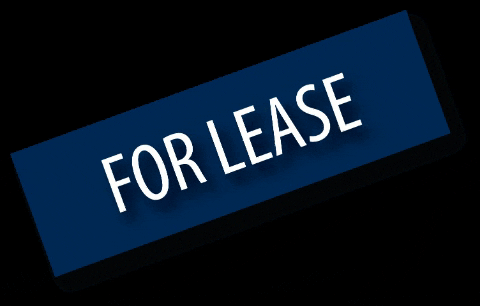
3. The renter has the right to a copy of the lease before signing
A storage renter needs to review a lease before signing it, as it is a legally binding document that holds both parties accountable in the event of any dispute.
By signing the agreement, the renter agrees to take on the responsibility of insuring the property or else being in violation of the contract.
Therefore, the renter must know all the lease requirements to protect their rights and avoid potential legal disputes.
Furthermore, the lease should describe the following:
- space available
- list any items the owner won’t allow to be stored there (explosives, biological hazards, illegal goods, flammable materials…)
- explain the security deposit
- provide a disclaimer stating that the storage place is not liable for injuries to people who get hurt while storing or removing their things
It is thus important for the renter to take the time to carefully read and understand the lease before signing it, as they could be held liable for any damages or losses resulting from their failure to abide by the conditions outlined in the lease.
In addition, some states have statutes for the sole purpose of backing up self-storage leases, such as the requirement to advertise a warning in the newspaper for people without homes if the rent is not paid, in addition to sending a warning by mail.
As such, the renter needs to be knowledgeable of the laws of their state to ensure that the storage facility’s owner is abiding by the law.
In conclusion, a storage renter needs to review a lease before signing it, as it is a legally binding document that sets forth the rules and regulations of the storage facility.
It is the renter’s responsibility to be aware of all the lease requirements before signing.
4. The renter has the right to know what will happen if he does not pay the rental fees
If the renter does not pay the storage rental fees, the owner can begin proceedings to sell the contents of the storage unit.
The owner must provide the renter with written notice of the default, stating the amount due, a demand for payment, a lien statement, and a designated person for the renter to contact.
The owner also has the right to deny the renter access to the storage unit until the delinquent rent is paid.
The owner may also impose a reasonable late fee each month if the renter does not pay rent when due.
If the renter is delinquent on rent for more than 30 days, the owner must notify the renter if he plans to follow up on the default and repossess the property inside the storage unit.
If the renter does not pay the back rent and the notification has been made, the owner can sell the property stored in the unit at a public sale for cash.
5. The renter has the right to know what will happen to his belongings if he does not pay the rental fees
If the renter does not pay the rental fees, the storage facility owner can deny the renter access to the space until the delinquent rent is paid.
In some states, the renter must provide written notice to the owner of any property inside the storage facility with a lien or secured by another person or business.
After 30 days of non-payment, the owner must notify the occupant of the default, including the amount due, a demand for payment, a lien statement, and a designated person to contact.
If the delinquent rent is not paid, the owner has the right to advertise and sell the contents of the facility at a public sale for cash.
If the renter pays the past due rent and associated late fees before the sale, the owner must return the property to the renter but may require the renter to take their belongings elsewhere.
The owner also has the right to charge a late fee if the rent is due by a certain date and the renter fails to pay it on time.
This late fee can legally be multiplied for each month the renter is late with that month’s payment.
Renters need to be aware of the laws and regulations to avoid any potential consequences of non-payment.
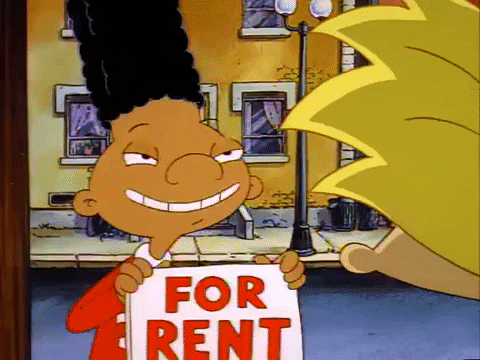
6. The renter has the right to know if he will be able to access his belongings during the lease
The renter has the right to access their belongings during the lease as stated in the rental agreement. This normally includes the right to enter the storage facility at any time to access the stored property.
The renter also has the right to inspect the stored property to ensure it remains in the same condition it was when it was first stored.
The agreement should also include the right of the renter to be informed of any changes to the terms of the agreement and any new terms or fees that may be imposed.
The renter should also be informed of any lien or security placed on their stored items and any insurance required to protect their belongings.
Furthermore, suppose any part of the rent or other charges remains unpaid for six days.
In that case, the storage facility’s owner may deny the renter access to the storage space.
Lastly, the renter should also be made aware of the rules regarding the owner’s right to evict the possessions due to non-payment of rent, including the notification by mail at the last known address.
7. The renter has the right to know what will happen to his belongings in case of fire, flood, or other property damage
Storage renters have the right to be aware of any insurance protecting the stored property required by the renter.
This may include fire insurance, theft insurance, or other policies that protect the items from damage.
Furthermore, the renter must inform the storage facility owner before signing an agreement if any property within the storage facility has a lien or is secured by another person or business.
In case of fire, flood, or other property damage, the renter is responsible for any insurance protecting the personal property stored within the storage space against fire, theft, or damage.
The owner is under no obligation to provide insurance.
Upon the failure of a tenant to pay the rent when it becomes due, the owner may, after 5 days from the date the rent is due, deny the tenant access to the personal property located in the self-service storage facility or self-contained storage unit.
In such a situation, the owner may proceed without judicial process if this can be done without breach of the peace or may proceed by action.
8. The renter has the right to know if a storage unit company will be liable for any injuries sustained in the storage unit
The renter has the right to know if the storage unit company will be liable for any injuries sustained in the storage unit.
This should be clearly stated in the lease agreement.
The agreement should also specify what types of insurance protecting the stored property are required by the renter, such as fire insurance, theft insurance, or other policies that protect the items in storage from damage.
The agreement should also include a disclaimer stating that the storage place is not liable for injuries to people who get hurt while storing or removing their things.
Furthermore, the rental agreement must show any insurance protecting the stored property the renter requires.
Lastly, the agreement should also include a statement that the occupant’s property may be subject to a claim of lien and may even be sold to satisfy the lien if the rent or other charges due remain unpaid for fourteen consecutive days.
9. The renter has the right to know if a storage unit company will be liable if anything is stolen from the unit
A rental storage unit company should provide potential customers with detailed information regarding the security of the storage unit as well as any insurance requirements for the stored property.
This includes information about security features such as locks, cameras, and other surveillance measures, as well as the company’s policy on who is liable in the event of theft.
The company should also provide a disclaimer that states that the company is not liable for any personal injury or property damage in or around the storage unit.
Additionally, the company should provide information about any insurance requirements, such as fire insurance, theft insurance, or other policy that protects the items in storage from damage through precarious means.
Furthermore, the company should also include any lien laws in the rental agreement.
It should state that the renter must let the storage facility owner know before signing an agreement if any property within the storage facility has a lien on it or is secured by another person or business.
10. The renter has the right to know if there are any dispute resolution options available if a dispute arises between him and the storage
When disputes arise between a storage renter and the facility’s owner, several options are available to resolve the issue.
The first step is to check local laws, which may vary from state to state.
The rental agreement terms should also be reviewed to ensure the tenant complies with the agreed-upon terms.
Many states have statutes that outline the rights of storage renters.
These statutes typically provide the rules for evicting possessions due to past-due rent and notifying the renter of the potential sale of their possessions if payment is not made.
In some cases, the renter may have the right to contest the eviction or have the possessions returned.
If the dispute cannot be resolved through legal channels, the renter may consider filing a complaint with the facility owner, filing a lawsuit, or seeking arbitration.
The renter should understand their rights and the potential consequences of each option before taking action.
A complaint to the facility owner may be the first step to resolving the dispute.
The renter should include their contact information, a description of the problem, and any relevant documentation or evidence.
The owner may be willing to work with the tenant to come to a mutually beneficial agreement.
The tenant may file a lawsuit if the complaint does not resolve the issue.
This can be time-consuming and costly, so the renter should weigh the potential outcome before filing the suit.
Lastly, the renter may seek arbitration.
Arbitration typically involves hiring a third party to review the facts of the case and make a decision.
This is often a less expensive and quicker method of dispute resolution.
No matter what avenue the renter takes to resolve the dispute with the facility owner, they must understand their rights and the potential impact of their actions.
Being informed and prepared will help the renter make the best decision for their situation.
FAQs
We’ve answered some of the most frequently asked questions about storage unit renters’ rights:
How long before a storage unit is considered abandoned?
If you have not paid your rent for a period of time, the storage facility may consider your unit abandoned and threaten to sell (or discard) your possessions.
Depending on the state, a storage facility is typically required to give you notice of your default (nonpayment).
Depending on the state, the facility must also notify you via a particular method (such as mail or email) or provide public notice of the upcoming auction.
Most states also require a waiting period of several weeks between your default and any public auction to give you time to pay off your debt and get your stuff back.
In Washington state, if the rent or other charges remain unpaid for six consecutive days, an owner may deny the occupant access to the unit.
If you don’t pay within 15 days from the date the notice is sent, the storage company may publish or post a notice of the sale of your property to the public.
When can a storage unit lock you out?
When any part of the rent or other charges due from an occupant remains unpaid for six consecutive days, and the rental agreement so provides, an owner may deny the occupant access to the storage space at a self-service storage facility.
In addition, the storage facility must provide notice of your default (nonpayment) and follow other procedures laid out in its contract with you, such as mandating that the storage facility notify you via a particular method (such as mail or email) or provide public notice of the upcoming auction.
Furthermore, the storage facility may require a number of weeks waiting period between your default and any public auction so as to give you time to pay off your debt and get your stuff back.
Is it legal for the storage facility to sell your things?
Yes, it is legal for the storage facility to sell your things if you are behind on your rent and the storage company has followed certain procedures outlined in its contract with you.
These procedures may include giving you notice of default and providing a waiting period between the default and any public auction.
Researching your state’s laws to determine the storage facility’s limitations on selling your possessions is important.
Does the storage company have to give me notice?
Yes, the storage company must give you written notice before they can sell your property for non-payment of the storage rental.
The written notice can be sent by email if your contract states, in bold type or underlined, that written notice can be sent to your email address.
You can also receive notice by letter or hand delivery.
The notice must include the following:
- an itemized account of what you owe
- the name
- address
- telephone number of the storage company office
- a statement that the contents of the self-storage unit have been seized under the rental contract. If you don’t pay what you owe before the 15th day after you get the notice, the property can be sold at a public auction.
Can I stop the auction that is selling my property?
If you have failed to pay the rent at your storage facility for several months, it is not uncommon for the facility to threaten to sell (or discard) your possessions, often via an auction.
However, this is usually only done after the facility has followed other procedures in their contract with you, such as providing notice of your default (non-payment) and following other state regulations.
Although it may seem like there is no way to stop the auction of your possessions, there are some things you can do to try and prevent it.
If you can pay the full amount owed, you should do so immediately, as this will give the company confidence that you are not a deadbeat.
If you cannot pay the full amount due, you can try to negotiate a partial payment or a payment plan with the storage company to prevent them from putting your possessions up for sale.

